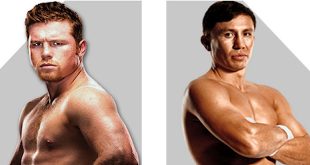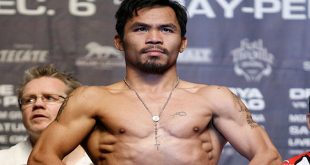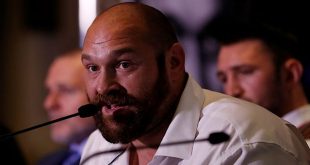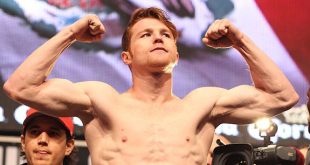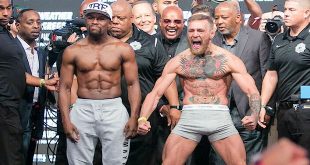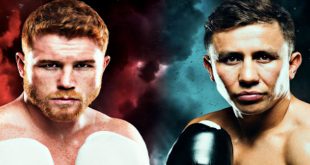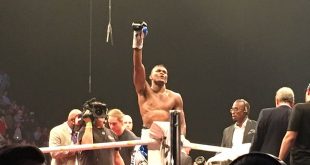“I think he knew, deep in his heart, what would have happened if we fought again. I think he really, really did know. And from a fighter’s point of view, I think that’s why he was asking for the crazy money, you know?”-Alex Arthur on rival Michael Gomez.
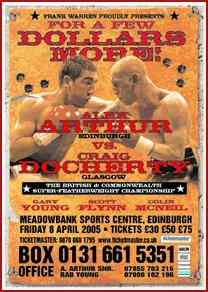 |
When I last interviewed Alex Arthur, the talent-laden Scotsman was in the midst of masterminding his return to potential greatness. Having rattled off three easy wins on the trot, Craig Docherty, the durable Glaswegian and long time friend of Alex, now stands between Arthur and a rumored world title opportunity. Given that Arthur’s promoter, Frank Warren, was the source, the verity of the rumor seems unquestionable and is added incentive for Arthur to pull out a show-stopping performance this coming Friday. |
Amidst all the rumors and the preparation for his upcoming fight, Alex was kind enough to chat with me for an inordinate period of time and, as always, was bubbly and chatty almost to a fault.
SaddoBoxing: How’s your training been going?
Alex Arthur: Absolutely brilliant, James. I mean, everything’s been fantastic. I can’t complain about anything, apart from the fact that I’ve been training since the 3rd of January. So it’s been a really long time. It’s been the longest camp I’ve ever done. But we’ve looked into it a bit and it doesn’t seem to harm the likes of Kostya Tszyu and Erik Morales. They all like to train from twelve-fifteen weeks. So that’s something similar to what I’ve done. I’ve never quite trained as long for one fight. So I’m hoping it pays of on the 8th, you know?
You do not want to miss the rest of this monster interview with Scotland’s outstanding super featherweight “Amazing” Alex Arthur.
SB: So is that eighteen weeks, then, you’ve been training now?
AA: (Pause) About fifteen, I think, by the time the fight comes.
SB: So you’re not worried about overtraining, at all?
AA: Well, no, we’ve got a really good Sport’s Scientist, who’s actually just became the director of British Sport. And he’s monitored the training schedule and worked on my heart rate. He’s done a lot of tests on me. When the fight was actually cancelled and put back, he increased the volume of my training but lowered the intensity. And we did that for…I think it was two or three weeks. So I think that really benefited my training.
SB: So who else have you been working with in this camp?
AA: Well, we’ve been working with probably the top nutritionist in the UK now. Her name’s Jacqueline Boreman. She’s from down South and she’s the head British Olympic nutritionist. I was put onto her by the British institute of sport, by Dave Collins. I worked with them in the amateurs and they’re really the best people you can be with. I used my connections back then, after the Gomez fight, to go back with them. And they revitalized everything for me and changed all my training, my diet and all that type of thing. It’s just been fantastic ever since. And Obviously Owen Smith, who’s been working with me since the Gomez fight, he’s an old Scottish pro. Kenny Buchanan managed and trained him and sort of brought him up, so to speak. He had almost 400 amateur bouts, sixteen pro bouts. He’s just an old school guy. Just exactly what I needed, who could tell me what to do in the gym. A quiet man that recorded my mistakes, mentally, and was telling me what I was doing wrong, rather than getting pats on the back from the people that I was working with, you know. And then, obviously, the trips down south to work with Jim McDonnell, who’s been a brilliant, brilliant inspiration for me and really helped me.
SB: I heard you did a bit of a tour of different gyms.
AA: Aye, took me out of my comfort zone, which was really important as well. I’ve not been out of my comfort zone for a long time and I was under the impression it was enough. And it wasn’t enough. So I’ve been traveling to the gyms and sparring with different fighters, adjusting to the climate, so to speak. And it’s worked perfectly, you know.
SB: Have you still been in touch with Freddie Roach?
AA: Aye, me and Freddie still talk quite regular. My amateur trainer Terry McCormack, who I’ve worked with in the pro’s as well, he actually goes over and works with Freddie. He helps Freddie in the gym and stuff. Terry’s just left the other day and he’s away over staying with Freddie just now, so aye we’ve been talking on the phone. I think I’m going over there this year at some point.
SB: Did you speak to him after the Morales-Pacquiao fight?
AA: Aye, I have actually, aye. I had spoke to him, but it wasn’t for very long. His battery in his mobile was running out so I’m gonna give him a call back. He just said to me that he was really, really unhappy about the gloves. And he thinks the gloves made the difference in the fight, you know. I don’t know if that makes much of a difference. Morales is an absolute legend. If you had to say, “Who’s your favorite fighter?” I’d probably say Morales.
SB: Yeah, I’ve actually got him as my pound-for-pound number one.
AA: Well, you know, I like to look at people who I could compare myself to and who I could mould my style on and learn things from. And that guy would be Morales. Well, I’m half an inch taller than him or so. But, it’s like, we have the same height, the same style , can fight at close range even though we’re rangy, good jab, good technical boxing. So I like to mould myself on him and have a good look at him and see what he’s doing.
SB: Everyone seemed to be writing him off, but I said from the start that I thought he was going to beat Pacquiao because Pacquiao’s a bit one-dimensional.
AA: He is one dimensional, but he’s remarkably fit. He’s very, very strong, but my biggest concern was the size at the weight. Morales is a huge super featherweight. He almost looks like a lightweight, a light welterweight in that ring, you know. I think Morales weighed ten-stone-two and a half on the night. Am I right or am I wrong?
SB: I can’t remember exactly. I imagine it was something like that.
AA: He didn’t come as heavy as for the Barrera fight, when he was ten-stone-five or something. But for Pacquiao he was only ten-stone-two and a half, which suggests that he probably did his weight more by losing fat and retaining a bit of water on his body. From personal experience, I imagine he done it like that. But he wasn’t as heavy and I don’t think he was as sluggish against Pacquiao as what he was against Barrera. But saying that, though, Barrera did go to the body very early and that would have taken its toll on Morales in the later part of the fight.
SB: The last time I interviewed you, you said that you didn’t feel you were quite at Morales’ level.
AA: Oh, nowhere near it, man.
SB: Do you think you’ll get to that level, though?
AA: I honestly believe in my heart that God’s got a plan for me and that one day I’ll be at the same level as Morales. Unfortunately, it’s not gonna be at the same time as him. Do you know what the thing is, James? I was always a late developer. And even though I was doing things young, I was always a late developer. I mean, I fought the world and Olympic champion when I was seventeen. Even the Sport Scientists and the people that I’ve worked with have all said I’m one of those people that will peak in my thirties, you know, rather than my early twenties or late twenties.
SB: I read that you have some sort of timeframe, and that you won’t be sticking around that long, though.
AA: I did say it in the past, but I’ve listened to these professional people now, who know what they’re talking about, and I can see from the tests they’ve done on me that I’m improving with age. And by the time I’ve turned twenty-eight or twenty-nine, when I’ve got a bit more experience, I think by that point in time I’ll look at myself as being on a par with the Morales’ of this world.
SB: Obviously you know more about this stuff than me, but I don’t feel that you’re that far away from being at that level.
AA: That is really, really appreciated, by the way.
SB: I mean, one of the best rounds I’ve ever seen you box was, ironically, against Gomez in the second round…
AA: Ah, jeezo, you know what, I’ve had so many nice letters from old champions, and I’ve had old champions talk to me, the likes of Ken Buchanan and Charlie Magri, Jim McDonnell and all these guys. You know, so many old fighters have said to me that it’s the best round they’ve seen in a British ring, that it’s the best boxing display they’ve seen in a British ring for the past twenty-five years. And I was just astounded at that. And I thought it was fantastic. It was really just me coming out there. That’s what we’d actually practiced to do. But unfortunately, prior to the bout, there were so many problems. You’ve probably heard about it all. I was seven pounds over on the day of the weigh in. I was in very bad health. We’d just bought a brand new house and I’d actually done the moving myself only a few weeks before the bout. I slept on the floor. I just did so many stupid things. A lot of it had to do with ego. And I believed that because I was in such a comfort zone, and on a roll, that I was just gonna blast the guy out anyway. And my mindset had changed. I think that it was God’s wee plan for me, to make me take a fall before I could rise again. I believe that so much.
SB: How did that change your attitude? I mean, apart from all the technical changes and all that.
AA: Oh, massively, mate, massively. It was actually strange, right, but my family, as you can imagine, were all absolutely heartbroken. I mean, I had 112, I think, amateur bouts, had never took a standing count, won European silver and Commonwealth gold medals, boxed in two world championships. And in one world championship, I never even lost a bout. I had to withdraw because of injury. And then I just blasted through all of my professional opponents. I mean, I think that my family and that thought that this was gonna be the case right through my career. I actually got up the next day with a smile on my face and everybody was a wee bit shocked. And I said, “That was exactly what I needed.” I said, “This is probably the greatest wake up call I’ll ever get.” And from that moment on, I knew that I had to prepare so meticulously at this level, for the rest of my career, that it wasn’t real, you know? That’s when I made the changes to my diet, my lifestyle, to the people that I had “round about me. And for my confidence, it actually put my confidence through the roof even more than it already was, you know?
SB: One of the problems that were covered in the past was that you seemed quite upright, that your chin was up in the air…
AA: Aye, that was a big problem as well. And because I was going through my opponents, I really didn’t feel the need for defense. But what I will say to you, and I must make this quite clear, is that I had horrendous difficulty with my back. It’s a hereditary thing. My dad’s actually had five operations on his spinal column. I had a curve in my spine. I also had a trapped nerve and it was badly affecting my sciatic nerve, so I couldn’t really move from the waist believe it or not, for like four or five fights. I couldn’t bend or roll. If I done anything like that, I seized up and was in a lot of pain, so we hooked up with, in my personal opinion, one of the best physiotherapists in the country, Sandy Lyle, who’s the Scottish rugby physio and the Olympic judo physio. She’s dealt with a lot of combat people and she just got me spick and span. And I would also say that the move to Peter Harrison’s gym, as a youngster… I always had a very fast, flashy, American type style. Even in the Amateurs, I was always very hard to hit. I mean, I never won all those honors as an amateur with punching power. I won them with skills and being able to avoid punches and reading people so well. But when I went to Harrison’s gym, they told me that head movement wasn’t a necessity, that it was an English thing that was done just to make you look busy, that you really didn’t need to do it that much, you know? And I ended up working like that for two years, under that style, and it just didn’t suit me. But now it’s all came back to me. My natural movement and my defense has just all came back. And it feels good.
SB: I covered this in my last interview with you, about your chin. I always thought you took the punches really well. I think your punch resistance was due more to your chin placement more than anything else. So the fact that your chin was so high and you were taking that many shots, and still nearly stopped him, obviously proves that you can take a shot…
AA: Aye, aye. Well, without being big headed and boastful, I’ve always been well known for holding a shot. I mean, in 112 amateur bouts, I never took a count. I’ve never been on the deck in my life, apart from the Gomez fight. My punch resistance was dead, I think, for the simple fact of the problems that I had. It’s definitely down to that. It was nothing else. I mean, I’ve took flush shots from welterweights and some real punchers. I think the biggest puncher I’ve fought as a pro was Patrick Malinga. Mzonke Fana, the guy who’s fighting Barrera, made that comment himself. He said the hardest puncher he ever fought was Malinga. And actually, Malinga fought a guy who went nine rounds with Freitas and Malinga knocked him out in a round. He said that Malinga punched harder than Freitas. Actually, he was just recently done for steroids, Malinga, you know? Maybe that’s how he could bang so hard. I mean, he could punch harder than Gomez, but because I had prepared a bit better and made the weight better, I withstood the shots. The American people—Showtime—who done the fight even commented on my chin and how good it was. I think I proved that in the Gomez fight, you know?
SB: A lot of people made the argument that when he first hit you, it almost seemed a bit of a shock and that your head was being knocked back…
AA: This is true, aye. It was just a joke really because about four days prior to the bout, I started taking a swelling in my throat and I had a lot of difficulty swallowing. It was a gland on the right hand side of my throat, which had inflamed and became poisonous. Therefore, I think it was on the Tuesday, with the fight being on the Saturday, I stopped eating solid food. And I couldn’t train, so I lay in bed and sipped water for four days, and it must have just killed me. But because I thought I was on antibiotics and was only drinking water, I thought I would probably be under weight by the time the weigh-in came. But because of the antibiotics I was on, they actually retain the water in your body, so when I got up on the morning of the weigh-in, I was seven pounds over the weight. So, as you would imagine, I had to stick the black suit on. My girlfriend was crying and she said, “Please just phone Frank Warren and tell him to cancel the fight. You can’t do it, Alex.” And I was like, “It’s the first fight in Edinburgh. We’ve got massive ticket sales. Imagine the whole public; the city would want me hanging from a lamppost if I called off. And they really wanted Gomez’s blood. So I managed to get five pounds off but I still had that two pounds that I just couldn’t move. And I was absolutely dead. I mean, I was like a walking zombie. Debbie, my girlfriend, was crying. My mum was crying. And obviously, I had to go to the steam room. You know, I failed the scales and had to go to the steam-room, wrapped in towels to get the rest of the weight off. I just never recovered in the twenty-four hours, you know.
SB: Speaking of Gomez, I assume you saw his fight against Alvarez?
AA: Yeah, I actually won a thousand pounds.
SB: Did you bet on Alvarez, then?
AA: Aye, I picked the round. I got a phone call from Ladbrokes and they said, “Would you like to make a bet and we’ll send it down south just to rile Gomez up?” I said, “Ach, oh well then, it’s fun and it’s harmless.” And they said that if I win and pick the round, they’d give me 8-1 and send one to a charity of my choice. So I picked the sixth round and sent it to the Tsunami relief and I got myself some money as well.
SB: When I spoke to you last time, you said you were worried about Gomez losing.
AA: I was. I was absolutely terrified. I remember, in preparation for the Odumase fight, I came home from London for the weekend and we watched the fight against the little Russian guy, and he staggered him. And I was on my knees shouting at the TV, “Come on, Armstrong, you can do it. Dinnae blow our big fight!”
SB: (laughing) In saying that, it didn’t look like he was for giving you that fight. He’d priced himself out of it.
AA: I think he knew, deep in his heart, what would have happened if we fought again. I think he really, really did know. And from a fighter’s point of view, I think that’s why he was asking for the crazy money, you know?
SB: So does that hold no interest for you now?
AA: Well, he’s really got nothing to offer me now. And he is definitely, definitely moving to lightweight. He’s never gonna box as a super featherweight again. I’m really good pals with Matthew Macklin and Matthew’s told that he’s definitely fighting at lightweight.
SB: Do you see yourself ending up at lightweight or even light welterweight at some point?
AA: Most definitely, most definitely. And not for the fact that I’ve struggled to make the weight now, but because it’s a challenge I would love to take on. It’s a challenge that I would… You ask all the right questions, eh? This is the best interview I’ve done for ages, man.
SB: (laughing) Thanks very much, Alex.
AA: I’ve always wanted to win a world title at the same weight as Ken Buchanan. That’s always been a wee personal boxing goal of mine. And having had a chat with my nutritionist, she reckons I’ve got a year of making super featherweight easy enough, and then after that it would become a struggle. So she says by the time I turn twenty-eight she’s considering moving me to lightweight.
SB: We better move onto the fight against Docherty. You’ve known him quite a long time…
AA: Fantastic guy, really, really nice guy. We’ve been great pals for a long time. We were on the national team together. We always got on well. He was often like my wee sidekick. I often looked after him on occasion. If he was struggling with his weight, I would help him; tell him the best way to do it. And when we went to the tournaments, I was coming away with medals, and I always won Gold, Silver or Bronze. Craig often cameaway with nothing, you know? I think he looked up to me. I just like him so much. He’s such a nice guy.
SB: He has improved a lot since that fight against Gomez, hasn’t he?
AA: He has. He’s came on a ton.
SB: And then he fought Sinitsin. Sinitsin was very dirty in that fight, to be honest.
AA: I’ll tell you what he was, he was very smart. He’s a smart fighter and you can’t take anything away from the guy. He’s a cagey cat. And Craig is… and you probably agree with me on this because it’s obvious you know about boxing and you’re a boxing man. Craig is very one paced. And he always, always has been. When Craig was an Amateur, he fought like a pro. He fought at a pro pace and he fought like he had to do twelve rounds. He’s always had a problem with high tempo.
SB: I think he’s a bit like Scott Harrison, in that respect. He’s a bit one gear.
AA: Aye, but believe it or not, Scott can go through the gears. Scott fights at a bit of a faster pace than Craig. You watch Scott against Chacon. You know, he had the bell on him for twelve rounds. Scott can fight at a hell of a pace. But Scott’s got to get to that pace. If Scott doesn’t set that pace from the start, he finds it very difficult to change the gears, you know?
SB: Oh yeah, by the way, I was going to ask you about Harrison’s fight against Polo. Did you see it?
AA: (pause for thought) I did, yes.
SB: What did you think?
AA: I thought Scott lost the fight by two rounds.
SB: I thought the draw was the right result. But I may have been a bit kind to him because I thought he won the first half of the fight. In retrospect, he probably did lose the fight. Where do you think he goes from here?
AA: I believe Polo’s fighting Marquez.
SB: Aye, he is.
AA: What I think will happen there is Marquez will smash Polo in about six or seven rounds, tops. And I think it will actually show you real world class compared to the level Scott’s been fighting at. You know what I’m saying?
SB: Aye. Do you think Scott has the potential to fight at that level, though?
AA: I don’t think he’s really ready to fight at that level yet.
SB: So you think it would have been a mistake to have taken a fight against Marquez?
AA: It depends on the money, you know? But Scott maybe can’t lose. I mean, if he was to give Marquez a tough fight, he wouldn’t be out of the picture. Hardly.
SB: To be honest, Marquez is completely the wrong style of fighter for Harrison, I think. I think he would counter-punch him all night.
AA: He’s cagey, man. He’s smart. He’s a beautiful counter-puncher. And he’s calm. He’s nice and calm. You have to be calm to beat Scott. You can’t be erratic and beat Scott, you know? You’ve got to be really calm under pressure with Scott.
SB: A lot of people say that the likes of Pacquiao would smash Harrison. But Harrison’s got a good chin and I think he could match Pacquiao better because of his style.
AA: Yeah, Harrison’s a tough guy, man. I think he could match him. I think that would be a smarter option for Scott. And he’s much physically bigger and stronger than Pacquiao.
SB: Think we’ll get back to Docherty now. So what do you think his strengths and weakness are?
AA: I think, to start off with, his strength and his durability. If he sets the pace, he can maintain it for twelve rounds. He rolls punches nice. He’s got a nice wee defense. And his weaknesses are that he doesn’t like to train hard. He never has. And I know him. He finds it very hard to up the tempo of a fight. He’s always fought at one pace and he probably always will. And his cuts, his cuts, I would say, are probably the worst in Britain. They’re worse than Ricky Hatton’s now and I’d say probably on a par with Damien Kelly. I think he’s a really bad cutter and I think that’s really unfortunate for Craig.
SB: Why do you think that is? Do you think it’s just something that’s in a fighter and can’t be changed?
AA: I think that, personally, cuts has got something to do with lifestyle. I think that if you don’t look after your body 110% properly, that you’re going to sustain cuts. I think if you like your beer too much, you know, and things of that nature, I think that cuts is something that’s gonna come to you.
SB: Assuming you get past Docherty…I know you don’t like to look past anybody. But ideally, what route would you like to take if you get past Docherty?
AA: Well, obviously I’ve not really sat down and thought about it. But I’ve heard rumors that Warren’s got a world title fight in the pipeline. What world title, I don’t know. I know for a fact I’m number one for the European. So I’ve got a couple of options there and I think Sinitsin would be my preference. I would love to win British, Commonwealth and European. I think that would be a fantastic achievement.
SB: If a fight came up against the likes of Anchondo…
AA: Freddie Roach thinks I’d beat Anchondo.
SB: So do I. I honestly do.
AA: You think so? (surprised)
SB: Yeah, definitely.
AA: Wow. Well appreciated, well appreciated.
SB: So is that something you’d look at?
AA: Aye, most definitely. I had a wee chat with Freddie about that. And Freddie was saying if I was fighting Anchondo, I could go over there and prepare. He would get me ready. I’d go back to Jimmy Mack and be in great shape. They’d get me fantastic sparring. And he’s like, “I really think you can beat Mike because I’ve seen Mike spar with Bernard Dunne and I really fancy your chances against Anchondo.” And I was like “Wow, that’s really good.” And he went, “He’s strong, Alex, and he punches quite hard, but I really think your boxing and your good body punching would deter him a wee bit.” And he also said that my good jab would be the key.
SB: Well, cheers for your time, Alex.
AA: No worries, my man. By the way, just your personal opinion, how do you think the fight’s gonna go? I’m not at all offended if you don’t think it’s gonna go my way.
SB: I think it’ll go your way. I’m just wondering, because Docherty does have quite a good chin, if it’ll be points or if you’ll maybe stop him on his feet. So I see it going your way, but I don’t know how. If I was to bet, I’d say points.
AA: Do you think so, aye?
SB: Aye because I think Docherty has a good chin. There’s a possibility you could stop him on his feet, I suppose.
AA: What about body punches?
SB: Well, I suppose that could be a factor, as well. (pause for thought) See, you’ve put me on the spot here, Alex (laughing)
AA: (laughing) Oh no, I just like to hear people’s opinions. And often when people say, “Oh, I think you’re in for a hard night,” it spurs me on.
SB: Alright, Alex, I think you’re in for a hard night (laughing).
AA: (laughing) Aw, good stuff. That’s exactly what I wanted to hear. I’ll train harder tonight now!
SB: Ok, thanks again, Alex.
AA: No worries, my man. It was good to talk to you. Take it easy, mate.
SB: And you. Take care, mate.
James MacDonald can be reached at ac009b5460@blueyonder.co.uk
 Boxing News Boxing News
Boxing News Boxing News
